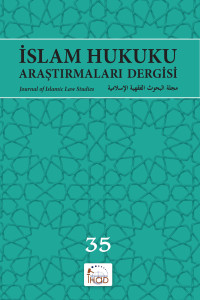Öz
Mantık, -kısaca söylemek gerekirse- bilinenlerden bilinmeyenleri elde etme faaliyetidir. Mantığın ilk dönemden itibaren İslam kültürüne nüfuz etmesiyle beraber istikrâ gibi mantıkî kıyas da İslam düşüncesinde yerini almıştır. Buna uygun olarak bazı fıkıh usulü eserlerinde mantıkî kıyas konusuna değinilmiştir. Akıl yürütme (istidlâl) klasik mantığın bir konusudur. Akıl yürütme tümdengelim (ta’lil), tümevarım (istikrâ) ve temsil (analoji) olmak üzere üçe ayrılır. Kıyas da klasik mantığının temel konularından biridir. Mantıktaki kıyas tümdengelimsel bir yöntemdir ve genel olarak ikisi öncül birisi sonuç olmak üzere üç önermeden meydana gelir. Mantıkî kıyas, öncüllerden mantık kuralları yardımıyla sonuca varma şeklindeki zihin işlemi ve akıl yürütmedir. Fıkıh usulü de genel olarak şer‘î delillerden fıkhî meseleleri çözüme kavuşturma yöntemidir. Mantıkî kıyas, hükmü Kitap, sünnet, icmâ ve kıyasla belirlenemeyen fıkhî meseleleri çözüme kavuşturmak bakımından önemli bir fonksiyona sahiptir. Şöyle ki bu tür fıkhî bir problemle karşılaşan ve çözüm arayan fakih her şeyden önce karşılaştığı meseleyi bütün önemli özellikleri ile tespit eder. Daha sonra küllîye ait olan hükmü göz önünde bulundurmak suretiyle problemi çözer. Bu çalışmada usulcülerin mantıkî kıyası hukuk metodolojisinde bir yöntem olarak ele alıp almadıkları ve fakihlerin de onu fıkhî meseleleri çözümlemede ne ölçüde kullandıkları incelenmektedir. Bu bağlamda çalışmada mantıkî kıyas metodu ele alınmış ve şer‘î amelî meselelerin çözümünde nasıl kullanıldığı üzerinde durulmuştur. Bunun yanında mantıkî kıyas ile fıkhî kıyas arasındaki farklar belirtilmiştir. Usulcülerin ortaya koydukları ve şer‘î bir hüccet olarak sahiplendikleri mantıkî kıyas metodu için söz konusu edilen problemlere istinaden karşılaştığı eleştirilere de yer verilmiş ve hem fıkıh usulü hem de fıkıhta mantıkî kıyas metodunun işleyiş şekli üzerinde durulmuştur.
Anahtar Kelimeler
İslam Hukuku İslam Hukuku Metodolojisi Akıl Yürütme Tümdengelim Mantıkî Kıyas Fıkhî Kıyas
Öz
Logic is, to put it briefly, the activity of acquiring the unknown from the known. As logic penetrated into Islamic culture from the first periodi syllogism of logic like induction took its place in Islamic thought. Accordingly, the issue of logical comparison is mentioned in some fiqh works. Reasoning is a subject of classical logic. Reasoning is divided into deductive (inductive), induction (stability) and representation (analogy). Comparative is one of the main subjects of classical logic. The comparison in logic is a deductive method and generally consists of three propositions, two of which are predecessors and one consequence. Logical comparison is the process of reasoning and reasoning, which is to come to the conclusion from the premise with the help of logic rules. The fiqh method is generally a method of resolving fiqh issues from sharia evidences. Logical comparison, provision The book has an important function in terms of solving circumcision, jurisprudence and jurisprudence which cannot be determined by comparison. In fact, the faqih who encounters this kind of fiqh problem and seeks a solution first of all determines the problem that he encounters with all his important features. Then he solves the problem by taking into consideration the judgment that belongs to the complex. In this study, it is examined whether the proceduralists consider the logical rationale as a method in legal methodology and to what extent the jurists use it to solve fiqh issues. In this context, the method of logical comparison is discussed and how it is used in the solution of sharia-related issues is emphasized. Besides, the differences between logical comparison and fiqh comparison are indicated. The criticisms faced by the proceduralists in relation to the problems mentioned for the logical comparison method, which they have adopted as a Sharjah force, are also mentioned and both the fiqh method and the method of logical comparison method in fiqh are emphasized.
Ayrıntılar
| Birincil Dil | Türkçe |
|---|---|
| Konular | Din, Toplum ve Kültür Araştırmaları |
| Bölüm | Araştırma Makaleleri |
| Yazarlar | |
| Yayımlanma Tarihi | 30 Nisan 2020 |
| Gönderilme Tarihi | 1 Kasım 2019 |
| Yayımlandığı Sayı | Yıl 2020 Sayı: 35 |



